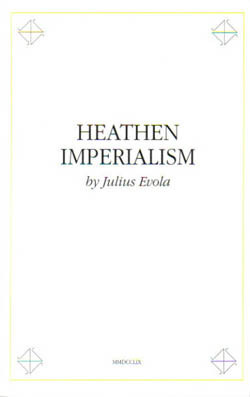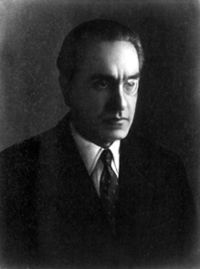
"Western Civilisation needs a complete overhaul or it will fall apart one day or another. It has realised the most complete perversion of any rational order of things. Reign of matter, of gold, of machine, of number, it no longer possesses breath, or libetry, or light. The West has lost the sense of command and obedience. It has lost the sense of Action and of Contemplation. It has lost the sense of hierarchy, of spiritual power, of mangods (...) Are liberation and renewal still possible in this crepuscular world? Is Europe capable today of the level of awareness necessary for such a task? Let us not be mistaken: it is only after having understood the magnitude of the task that we will be able to act. The threatening reality of a destructive spiritual process, whose roots originate almost in the ground of prehistory, whose culmination phases coincide with those which contemporary men exalt as their essential civilisational values, and whose influences now manifest themselves in all fields of thought and action, must be acknowledged. This is not a matter of compromises or adaptations. The power of a new Middle Ages is needed - a revolt, interior aswel as exterior, of a barbaric purity. Philosophy, "culture", everyday politics: nothing of all this. It is not a matter of turning on the other side of this bed of agony. It is a matter of finally waking up, and getting up." 147 pages Original Italian title: Imperialismo Pagano German version: Heidnischer Imperialismus
Author

Julius Evola (19 May 1898 – 11 June 1974), born Giulio Cesare Andrea Evola, was an Italian philosopher and esoteric scholar. Born in Rome to a family of the Sicilian landed gentry, Evola was raised a strict Catholic. Despite this, his life was characterised by 'an anti-bourgeois approach' hostile to both 'the dominant tradition of the West—Christianity and Catholicism—and to contemporary civilization—the 'modern world' of democracy and materialism'. By turns 'engineering student, artillery officer, Dadaist poet and painter, journalist, alpinist, scholar, linguist, Orientalist, and political commentator', he has been described as a 'rare example of universality in an age of specialization'. Yet behind it all lay a singular emphasis on, and pursuit of, a 'direct relationship to the Absolute'. For Evola, 'the center of all things was not man, but rather the Transcendent.' This metaphysical conviction can be seen to have determined both Evola's stance on socio-political issues, and his antipathetic attitude towards 'all professional, sentimental and family routines'. The author of many books on esoteric, political and religious topics (including The Hermetic Tradition, The Doctrine of Awakening and Eros and the Mysteries of Love), his best-known work remains Revolt Against the Modern World, a trenchant critique of modern civilisation that has been described as 'the gateway to his thought'. Since his death, also in Rome, his writings have influenced right-wing, reactionary and conservative political thought not only in his native Italy, but throughout continental Europe and, increasingly, the English-speaking world. Nevertheless, he should not be considered primarily as a political thinker, but rather as an exponent of the wider Traditionalist School that encompasses the work of such individuals as René Guénon, Titus Burckhardt and Frithjof Schuon.